
by Karin Kohlmeier | Aug 7, 2025 | contest winner, flash fiction
Dad calls it “Eyesore Trashtown”. I don’t read perfect yet, but looking at the letters on the sign, I don’t think that’s right. “It’s called Eastlake Terrace,” Mom says, hugging her purse tight and shooing me into the elevator. “Dad thinks he’s funny.”
Dad wasn’t funny this morning, whisper-fighting with Mom, both of them thinking I couldn’t hear, as me and her were leaving the house. In the car, I tried to ask her about it, how somebody could spend money they don’t have, and what he meant by calling this lady the Snow Queen of Welfare, but Mom’s look said shut my hole, so I did.
Now in the elevator, the wobbly box I’m carrying—with cans all on one side and a big box of crackers on the other—makes my arms burn. I distract myself by watching Mom change her face, so by the time the doors open, the line between her eyebrows is gone and she’s wearing a big smile.
The lady who opens the door Mom knocks on doesn’t look like any kind of queen to me. She has yellow hair like mine on the ends, but where it comes out of her head, it’s dark brown. She’s wearing a baggy t-shirt and stretchy pants that have holes in the knees. This is an apartment, which is like our house except way smaller and with a bunch of them crammed together in one building. It smells like old cigarettes and some kind of food I’m glad I don’t have to eat.
There’s a kid about my age—Annie, she says—and Mom tells me to go play. Annie’s room has three unmade beds and a dresser. The carpet has stains, and the closet door doesn’t close right. We sit on the floor, and Annie hands me a little plastic Snoopy—the kind with a hole in the bottom because it’s supposed to go on the end of a pencil. “I love Snoopy!” I say, but Annie says, “Don’t call him that.” She takes him back and rubs him against her cheek. “His name is Harrison K. Snooples The Third,” she says. “You can call him Mr. Snooples.” She kisses him and hands him back. I bring him to my nose and sniff. He smells like plastic, strawberry Chapstick, and dirt.
While Annie digs in the closet for more toys for us to play with, I watch Mom and Other Mom unload the groceries in the kitchen—all the cheapest brands, like Mom says, we’re going to have to start buying.
“Let’s play Barbies,” Annie says. She hands me Ken, she’s Barbie, and Snoopy is their pet dog. Even though he’s way too small to look like their dog for real, Annie takes Barbie’s hand and makes it pat his little head. “Good dog, Mr. Snooples,” she says. “I love you.”
I’ve been trying out a word I learned from Dad, and I shout it out now as loud as I can: “Imbecile!” I lift Ken’s arm and do my best Dad voice: “This imbecile thinks he can lay me off when I gave my heart and soul to that company!”
“Let’s kiss,” Annie says and smooches Barbie’s face into Ken’s.
When the kissing is done, I sit Ken down on the floor and put Snoopy on his lap. I make Snoopy go around in a circle three times before he sits down like a real dog. “Good job, Mr. Snooples,” I say because I know Annie will like it. She laughs and goes digging in a pile for a new dress for Barbie to change into.
I watch Mom in the kitchen talking with Other Mom. The line in her forehead is starting to come back. In the store earlier, she got a notebook out of her purse and did a bunch of math problems, then she put back the steaks she was buying for our dinner and got a package of hamburger instead. She had promised me Pop-Tarts, but she changed her mind to “maybe next time.”
When it’s time to go and I stand up to leave, Annie asks for Mr. Snooples back. I say, “I gave him back to you. Where did you put him?” and start lifting Barbie clothes, hunting under them for the Snoopy. Mom says let’s go, and we leave Annie crawling on the floor, flinging aside Barbies and clothes and calling, “Mr. Snooples, where are you?”
In the car on the way home, I take Snoopy out of my pocket. My window is rolled halfway down, and I hold him balanced on the edge of the glass. I lean him in. I lean him out, feeling the wind trying to catch him out of my hand. Then I let go. I crane my neck to watch him bounce in the road until he’s crunched under the car behind us.

by Ariana-Sophia Kartsonis | Aug 4, 2025 | contest winner, flash fiction
His body was cocooned in ice. A casket of ice. Like one of those gag gift ice cubes—plastic-clear with a fly trapped in the center. Illinois winter was that plastic cube and he—that boy—miles and years downriver—he was that fly.
He was that fly. If he’d been alive today, that’s what the girls might have said. He was a sweet-eyed boy with soft hair and paw-like hands. He came to school that year with a triangle of torso. Shoulders wider, body shrugging beneath as if the tension of all those years would send sparks to the ends of his fingers. Anyone who touched him surely lurching from the voltage.
Now, on a television screen ten years downstream, he zips by, still a boy, and frozen that way. His last breath is one of the plumes of chalkiness that made the occasional cloud through the clarity. As if, really, a decade dead, he might be in a glass magician’s case and breathing away, puffing out smoke-feathers of living breath and fogging up the place.
If that ice were a diamond, that breath would be the flaw.
He was their only boy. Theirs was an odd house and that boy, when we are all just kids then, he was always something else. Then he was gone. And that, became the most of who he’d been. The gone boy. The boy without a way back.
The parents moved away the next spring. The boy, by then, unfound, forgotten. We grew up. None of us were his best friend. None of us kissed him. No one knew his favorite color. The name of his dog. But we had all lied about one of these things.
Mine was the kiss. It felt like the truth because he was the pillow I propped on the left side of my canopy bed. He was the ghost I tried to bring back by the light of a strawberry candle and a gathering of plush animals. The makeshift ouiji board I made from cardboard, a pushpin, a construction paper arrow and symbols I copied from hieroglyphs, from Sanskrit and Arabic and any language that seemed mysterious and full of images I didn’t understand. It would take all these years and an ailing marriage later to know that any language would’ve worked.
But nothing brought him back. Even when I set my twelve year old room like a radio dial to host any number of creepy spirits. Even when that fruity candle cast a shaky spell of shadows on the west wall, I never felt his presence. I could terrify myself with those ghostwishing rituals and never once feel the slightest cool wind telling me he was there. His lakely cowhide flask of a form gone liquid in the most vaporous way. Lips still gray from the other world romantically dead and returned to me. I never heard the gurgle of him, mouthful of river, his hair laurelled with twigs and reeds never drizzled river on the impossibly pink carpet. There was nothing but the ritual itself—and like the most rigid faiths that alone sustained it.
Now he was back. The television ran him down that river a hundred times it seemed. Ran my childhood back to me—him there stuck in our twelfth year and me in my bathrobe—the scratchy terrycloth anniversary gift from my ill-fitting husband of four years, and the life I had accepted somehow, it seemed to me, by accident.
Me, pregnant and crying because I still had yet to feel as much as I had the year he vanished, the long dark winter I worshiped his absence, set up churches and séances and learned, maybe too well it seems to be now, how to cling to the vacancies more than the body. I wrote long letters in my journal, worked on making mine the curliest of cursives, my printing whimsical. I wrote of him and true love 4-ever, I wrote of the romance of the dark sorrow of our moth-life love. I understood saints who swooned themselves into ecstacies with their vespers. I prayed that boy back into being. Now he’d come back all wrong, swaddled in ice, glass, the dignity of the dead, but hanging there like a put-away puppet on the t.v.
The news said the body had been kept in ice these last ten years, that the boy, with the grace of better freezing and more advanced science, might almost be revived, arriving to the world ten years tardy with no good excuse and cold settled eternally in the marrow of his bones. Or maybe it said only that he’d been frozen alive, one blunt blow to the cranium and then dropped in a deep freeze coffin filled with water and frozen solid.
In diamonds it’s called an inclusion or an included crystal—a diamond or a crystal formed inside another. That baguette of ice and the boy suspended and floating in the glass rectangular nowhereness of the television screen. The images multiplying reminding me of an Escher drawing more than my life.
The life it held inside all that glass and ice was not the boy’s life anymore but my own losses. Tucked into threadbare place where once there’d been a shirtpocket I wanted there to be a letter written from the girl I’d been when he’d vanished. A drenched white envelope and inside, a letter in my heart-dotted i, bloated-bubble-letters spelling out just what it was I had once wanted so much. I wanted it to tell me how I hoped to feel about a life on ice, on hold, with a body suspended in my own, and love stopped cold in its tracks.
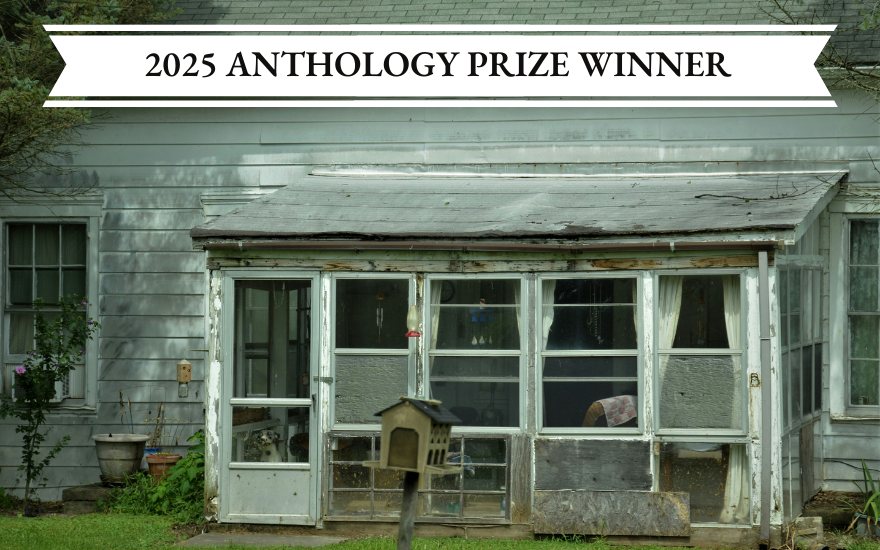
by Deborah Hunter | Jul 31, 2025 | contest winner, flash fiction
I was on our excuse for a back porch, no one ever put in screens, and it smelled like oranges under my finger nails. Jack lowered himself into the lawn chair next to the old Boy Scout cot I was on, looking up at the rain-stained roof with bits of tar paper peeking through. Old Spice tapped my nose. The guy loved Soap-on-a-Rope. He was nineteen and recovering from spine surgery. His sandy hair was matted around his significant ears. I didn’t get the details, but he had to go all the way to Syracuse to have the tumor removed.
“You counting nails up there or something?” Jack said.
“Just thinking.”
His voice was low like Dad’s. Slow like Mom’s. He was impatient with lugs like me and my all-time favorite. His current predicament seemed to give him a little more patience. Mom says he walked me around in the Taylor Tot when I was little.
I asked him once why he did it. “I loved riding in that thing when I was small,” he said. “And you liked to go, the word ‘go’ lit you up like a Christmas tree.”
“It’s not going to happen, kid,” Jack said.
“I can make it happen.”
I was going to Woodstock, it was a few hours away by car, and I could get most of the way by bus. I just turned thirteen, and my folks were, “hell no,” about it. It’s all I thought about, mostly so I wouldn’t think about Jack dying, not that anyone one said he would, but nobody said he wouldn’t either.
I would take the city bus from our neighborhood to downtown. Last year, while another brother was still in Vietnam, I took it all the way to Utica for an anti-war demonstration. Only twelve other people showed up, and I was the only one in Land Lubbers and Jesus sandals. That getup cost me ten nights of babysitting.
My folks thought the case was closed, my going to that “hippie-dippy weird thing,” as my father called it. I didn’t argue, counting on what Jack called, “benign neglect.” I had already tucked a pair of undies and socks in my book bag and would tell whoever was around on Friday, while the folks were at work, that I was going to the library downtown.
“You good, kid? I am going back in to take a pill and a rest,” Jack said like an ancient.
“Yep.”
I was scared when I got on that bus to Middletown. The creepy Charles Manson news, the war, and having never been farther than Oneida Lake. I had my map and a copy of Fire from Heaven. Twelve dollars in the right front pocket of my jeans and my return ticket in my bra.
A big, dark-haired girl sat next to me on the crowded coach.
“Where you going?” she said.
She hit the “you” hard, like in a gangster movie. Her eyes were so brown, and they disappeared when she laughed, and she laughed at everything. Like when I told her I was going to Middletown and then to Woodstock, and when the guy behind us asked why anybody from up here would go way down there to hang out with thousands of people who never took a bath.
“How old are you?” she asked.
“Fifteen.”
“Not.”
I shut up. She was probably only fifteen herself. But she had a different kind of life than me. I could tell she knew stuff, and I already loved her for that.
“How old are you?” I said.
“Fifteen, but it’s like in dog years. Why don’t you get off with me in Little Falls?”
I got off and we went to her place out in the country, a few miles from the station. Some old man in a pickup met her at the bus and drove us out to the house with faded orange paint peeling like a bad sunburn. The old man left without a word.
“Gramps never says much,” she said.
After we ate some chips with onion dip and drank some soda, we got on the bed in her room and talked. Her absent father, my sick brother, her dead horse and my brother in the war and the war being in the living room, her mother who is never home and always talking when she is, and saying things a kid shouldn’t even hear. We did stuff on that bed, with its quilt worn to the stuffing and stinking of Pall Malls and patchouli. She had slender fingers and no real wrists at the ends of her jelly roll arms. Her grief settled over me like fog on birches.
“I like the angles of you,” she said. “I dream of being what Gramps calls ‘lanky.’”
“Lanky isn’t you, it’s nothing special,” I said.
Then I wanted to go.
She called Gramps, and we rode back to the station. I got home before dark with my front pocket empty. I forgave her for that; twelve bucks wasn’t a lot to spend to get protected from your own silly self. I did some explaining, took my grounding of no buses for two weeks, and went to bed with a nose full of adventure.
That fall I contracted mono in the hospital after having my adenoids out. Jack had another surgery, and somebody brought the cot in from the porch and set it up in the living room next to the couch. We tried to do homework and watched the tube. We ate hot dogs and applesauce for lunch. The Miracle Mets won the World Series that October, which was worse TV than Lawrence Welk for a couple of diehard Yankees fans. I cheered for the Baltimore Robinsons (Frank and Brooks). Jack had bright red seams in his neck and holes in a head that was now held up by a contraption from Dr. Frankenstein’s laboratory. There was trouble ahead for the both of us.
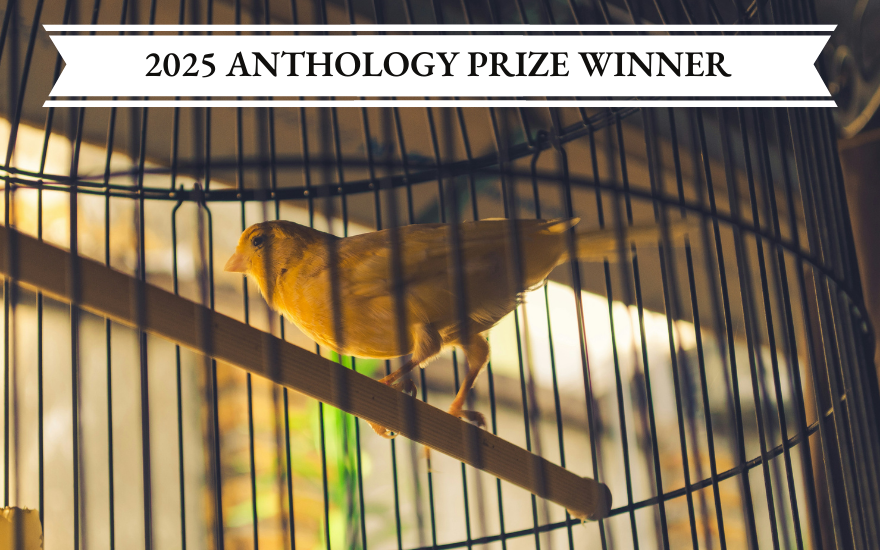
by Genevieve Eichammer | Jul 28, 2025 | contest winner, flash fiction
“The birds are always watching,” Mama used to say. We had a bird cage in nearly every room of the house. The parakeets in the living room seemed more at home than I did. The lovebirds in the kitchen reminded everyone how bonded they were every time you tried to make dinner. The dining room was free of her pets, with the intention of not making guests uncomfortable. Mama could not accept that we never had guests. Her taxidermied finch found its place in my bedroom, right on the windowsill. When I was younger, I tried to make it fly out of the window a number of times, but it always found its way back inside. The dead ones were always replaced, even if they could not be found. The smell of our bungalow in the summer heat was pungent even from down the road.
Mama’s room was the worst. The canaries rarely remained in their cages and would flutter around the room uncontrollably. The sick ones would slam themselves into everything. The bursts of bright yellow and orange were never-ending. “My stars,” she would say dreamily, as she admired them bouncing between the walls.
For my sixth birthday, as many children have, I asked for a dog. She cackled for days, weeks. Instead, I received a kiss on the cheek and a brand new bicycle. “When you’re all grown up, you can have a dog in your house,” she told me. I grew up, got a job, and applied to college. Zero acceptances. No dog. I stayed home and took care of aging Mama. The chain-smoking, combined with the stench of our home, left her coughing all day long. Mama never went to the doctor, but you could tell she was sick. The ringing in my ears was incessant, as was the hacking from Mama, and the chirping from the birds. For years, my coworkers, friends, and occasional romantic partner, insisted that I move out. But they didn’t understand. There was no one left to care for her.
On one of her bedridden days during a harsh winter, Mama begged me to clean the cage of the parakeets. She could not confess that they had not been cleaned in years, but rather pleaded with me to have mercy on the birds. I brought each bird to her room, one by one, letting them free on her chest. The fourth and final parakeet nudged itself into her neck. She cooed at them, petting them eagerly and showing incredible newfound strength as I shut the door behind myself.
The cage was better than expected. There was only one set of remains nestled away in the corner, which I scooped into a shoe box for Mama. She liked to keep all of her pets. The soiled paper stacked at the bottom was glued into place and only came free after chipping away at the sides with a butter knife. Mama insisted on using newspaper as a cage liner, as we would never run out. I could barely make out the date on a chunk directly in the middle, reading September 19, 1999. The smell penetrated my nostrils, but after two and a half decades, it barely phased me. I continued to read the scattered words, dates, and headlines throughout the mucky newspaper. The next fragment had my name on it.
I cleaned each cage in the house and made myself a puzzle. Mama was simply overjoyed that she was surrounded by the birds, trilling with them and caressing them as I worked to decipher the barely legible scraps I collected. After hours of searching, it was complete. ‘Congratulations! You have been accepted into Michigan State University! Welcome to the Class of 2002.’
I told Mama I was going to the store to get more newspapers. “Go on, the birds will take good care of me until you get back.” I spent that night at my coworker’s house. And the night after. After thirty-two nights of sleeping on his dingy blow-up mattress, I signed the lease on my own apartment.
The call from the sheriff came almost exactly a year later. I was on a campus tour. His voice was firm, grounding, “The deputies found her in her bedroom. Neighbours called about a wellness check. You know, about the smell. They thought it was the pets.”
“And the birds?” I questioned.
“Dead too,” he cleared his throat before continuing, “and a couple of crows came in through the window after she passed. But don’t you worry about that, funeral homes these days can fix things like that right up.”
Mama always left her bedroom window open. Her stars never left, but she prayed for new ones to join us and come through there to start their new life in our home. I have joined the Undergraduate Class of 2011 at Michigan State University, and my roommate does not seem to like me, or perhaps it is just my decor. The stiff finch from my childhood bedroom has found a new home in my dorm.

by Claire Gallagher | Jul 28, 2025 | contest winner, flash fiction
The bruises bloom like purple flowers. Hibiscus perhaps. Hibiscus rosa-sinensis. The marks will fade to a deep blue. Like cineraria. Cineraria senetti. After that, a sickly yellow.
Tansy. Tanacetum vulgare.
You recite the names in your head, your mouth forming soundless words.
A hairline fracture in the ceiling captures your attention. An imperfection in the otherwise immaculate surface. You’re surprised he hasn’t noticed. Fixed it. Like he tries to fix you.
Lying on the bed that you share, you wonder when he’ll be back.
It won’t happen again. I swear.
***
He likes to drink beer in the sunshine. Today he’s watching you plant marigolds.
Calendula officinalis.
“Make sure you don’t track dirt into the kitchen again,” he says. The bottle clanks as he places it down on the patio table.
You turn your face in his direction. Nod once. In your peripheral vision, you see him stand and stretch.
“I’m going for a nap.”
You turn back to your task, listen as his footsteps recede. You breathe in through your nose, out through your mouth.
***
The glass lies in fragments on the kitchen floor. You imagine one of them slicing into your finger, the blood that will flow down to your wrist when you hold it up. Rose-red. Deep Secret. Floribunda.
He’s at work. You must sweep up the mess before he returns. But you know his lips will tighten when he notices the missing tumbler.
***
Your gown is ankle length with a high neckline. Periwinkle blue. Vinca minor.
You did not want to come to the ball. Did not want to sit here while he bids for expensive lots.
A squeeze of your thigh. Warm breath in your ear. “You’d better not be making eyes at him.”
You realise your gaze has been fixed on the man seated opposite while your mind wandered.
A quick response. “No.” You focus your attention on your half-finished meal.
You sense him studying your profile. A heartbeat, two, three. Then his lips move to your neck.
***
“When are you coming to visit? I haven’t seen you for months,” your mother says.
Your grip tightens on the phone. “Soon.”
You wait for him to arrive home.
When he walks through the door, you keep your gaze on his tie. Black narcissus. Not black, but deep red. You offer your cheek.
“My mother called,” you tell him over dinner. “She wants us to visit.”
“She called you, or you called her?”
“She called me.”
He sighs. “You know how I feel about your parents.”
“If we don’t go, they might turn up here.”
A frown. “I don’t want your dad here, stinking out my house with his cancer sticks.”
Your father always smokes in the garden, but you don’t point this out.
“And your mother looks down on me.”
You remain silent.
“Look at me.”
You lift your eyes.
“Don’t I provide for you?”
You lick dry lips. “Yes.”
“Don’t I give you everything you could ever want?”
“Yes.”
“Am I not good enough for you?”
“You’re more than enough.”
He stares at you. “Then say it.”
“I love you.”
***
You join the queue at the bakery, inhale the yeasty aroma.
Three women sit at a table for four. They sip frothy coffees and share gossip. You remember what that’s like, the camaraderie of friendship, the intimacy of exchange.
There are no free tables. You wonder if you could buy a drink, ask to join them.
Pretend that you belong for a while.
Forget-me-not, you want to tell them. Myosotis sylvatica.
You reach the front of the queue, ask for the loaf, examine the drinks menu. Flat
white, you are about to tell the young man. But a small commotion draws your attention back to the table. The women are standing, kissing cheeks, promising to meet again soon.
“Anything else?”
You turn back to the server, shake your head.
***
You will pack lightly. Return to your childhood home.
There will be tears, anger. At him, not you. The police will be called. He’ll be questioned, held accountable. You can show them the fresh bruises between your thighs.
But he calls the office, says he’s sick, spends the day watching you with hooded eyes.
How did you know? You wonder. How did you know?
***
You lose track of days and nights. Your world is small, your isolation total. From eight to six, you live in silence, until the rain stops one afternoon and you can return to your garden. Now the birds sing to you. You almost smile.
Geraniums are re-potted. Pelargonium graveolens. You like the texture of the furry leaves, the earthy scent. Time becomes meaningless.
Until it isn’t.
***
You select a packet blindly and head to the counter. Your hand shakes as you tap your card on the reader. You don’t remember the journey home.
It’s awkward to hold the stick between your legs while you pee. You finish and place it next to the sink, then sit on the edge of the bath tub and stare at it until it reveals its secret.
Two lines. Pink. Anemone sylphide.
You lurch back to the toilet.
You’re still there when he returns. You push yourself up, fumble to hide the test at the back of a cupboard, swill some mouthwash.
“Where are you?”
You press the flush in response. Stare at the mirror as you wash your hands.
Who are you?
***
The lady’s voice is reassuring. “We’ll develop a plan with you, assign you a bed in one of our refuges. You’ll be safe there.”
Safe.
When you disconnect the call, you pack minimally and pause to look out of the kitchen window. Your garden is blooming. Perhaps the refuge will have a few flower beds you can nurture.
As you walk down the street, you do not look back.
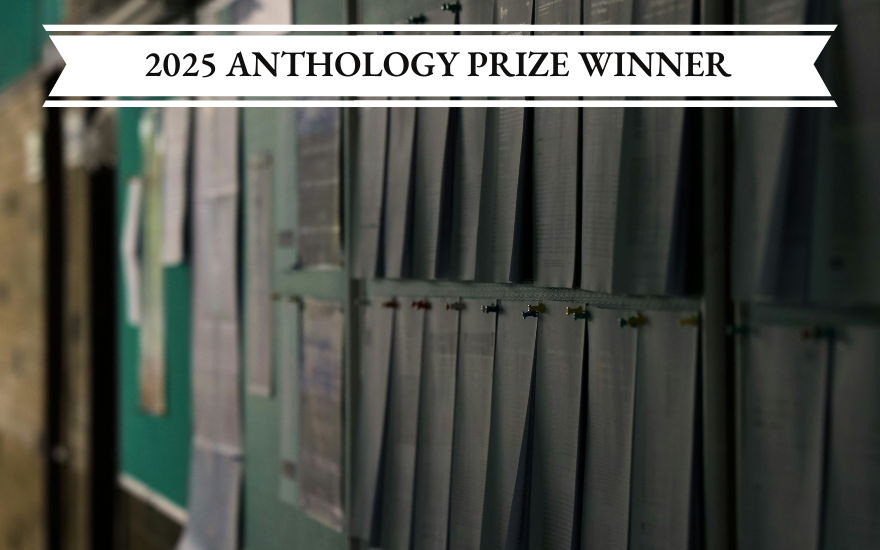
by Madison Cyr | Jul 17, 2025 | contest winner, flash fiction
I named her Christina. She began as they all did—a greasy secretion that shimmered and then solidified into a milky coat of wax. It reminded me of the hospital where we were only allowed to write with crayons because you couldn’t puncture someone’s larynx with a crayon. I spent my time there in the TV room with a box of Crayolas. I peeled off their labels and skinned their naked bodies with my fingernails. I did the same thing to Christina, leaving little white curls of her at my feet.
If not for the hospital, we never would have met.
I saw the poster on my way out. I delivered my discharge paperwork to the reception desk, where the friendly blonde nurse who had admitted me two weeks before was working.
“Feeling better?” She asked. Her tone was so upbeat, I didn’t want to disappoint her.
“Much,” I said. That made her smile. She told me to have a wonderful day.
The world outside was so bright and cold and sure of itself that I hung around in the lobby for a bit just to gather courage. There was a community bulletin board near the sliding doors, and that’s where I saw it.
CLINICAL TRIAL – PAID
Looking to lose 50 pounds or more? You could be eligible to participate in a paid clinical trial for Vitalex.
Maybe I would want to kill myself less if I lost 50 lbs.
***
They told me it would happen, but still, it was a shock. The wax thickened and hardened. It fell in warm clumps where my joints met. They asked me to collect as much as I could. I saved the clumps and scrapings in dated plastic containers that I refrigerated and delivered to the lab at my weekly check-ins.
At the end of the trial, they gave me my check and asked if I wanted to keep my “production” now that they had no use for it. The trial lasted 6 weeks. No one ever said the word “fat”.
She weighed in at 54 pounds. The day I took her home, I searched for “Vitalex Production” on TikTok.
A skinny man in some seaside village sat beside a behemoth mound of yellow tallow. It glistened in the sunlight. He called it Davi and ran his palm over its wet back. Something in his expression touched me. A private smile lifted his lips. His eyes were soft and watery. He opened his hand so wide, splaying all his fingers out, like he couldn’t get enough.
I looked at my tub of gray production and grimaced. It wasn’t a good look for her, the five-gallon storage bin. And she needed a name. I named her Christina because of the obvious religious parallels. Immaculate conception and all that, and the fact that my own name is Mary.
I bought her an aquarium and wrote messages on the outside with those markers people use to write on car windows:
You’re beautiful.
Welcome to the world! It sucks.
My mood lifted. It was good to have somebody to talk to.
A week in, and there was a smell. A cross between earwax and the inside of a belly button. I kept a cinnamon candle burning all day, and that seemed to do the trick.
After a month, the mold appeared in little green freckles across her sallow face. Something had to be done. It was the right thing to do, the only thing to do. I had to take her back.
I’d made Christina over the course of a decade. A few pounds every year, most of it in the past 18 months when nothing stirred my appetite except ice cream. I bought it in gallon tubs and attacked it with a spoon every few hours. It took time to make her, and it would take time to remake her. The idea was both frightening and a comfort. I missed and was repelled by my old body. But this new body presented its own set of challenges. Even though I was smaller, I found it harder to hide. Men’s eyes were everywhere—as omnipresent as the sun or the sky, another element that could kill you from exposure.
I put her in everything. Fried eggs in the morning, a scoop stirred into my coffee where the fat would rise to the top and form an iridescent film. I plopped spoonfuls of her into empty Cool Whip containers and set them out for the stray cats. But it wasn’t enough. I needed more mouths.
Misty was the only person I could think of. We’d exchanged info in the hospital, careful numbers copied down in red crayon. She was thrilled.
I made a feast. Two dozen buttermilk biscuits, brown butter gnocchi with fried sage, and a spice cake with buttercream frosting. Enough for us both to feed off the leftovers for days. I didn’t hide Christina or make any effort to conceal her role in the meal, and Misty didn’t seem to mind. One might say it brought us closer. When I hugged her, I said to myself, “I love you, Misty. I love you, Christina.”
It took a month. On our last morning together, I drank my coffee slowly. By then, Christina had a warm, earthy taste, like morel mushrooms. When the coffee was gone, I scraped the sides of her tank with a spatula and set the remains out for the cats. It was a cool spring morning, the dew shone silver on the grass. The cats were waiting for me, their fur shiny and clumped with grease. They wrapped their stout bodies around my ankles and let me scratch behind their ears. When they’d licked the bowl clean, they looked up at me with sorrowful, expectant eyes. I held out my empty hands.
by Fractured Lit | Jul 17, 2025 | Uncategorized

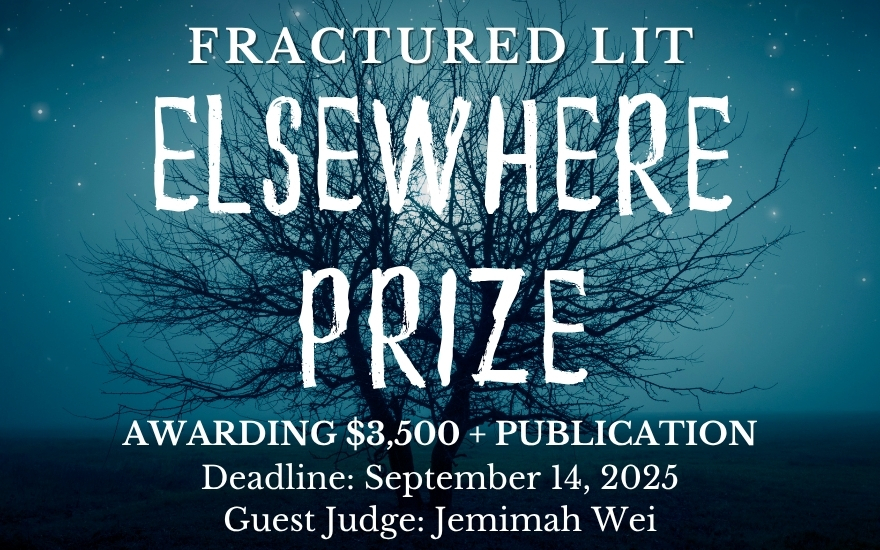
judged by Jemimah Wei
July 17 to September 14, 2025
Add to Calendar
submit
Ready for the opportunity to turn reality on its head? We’re bringing back our Elsewhere Prize! We want those stories that make a mystery out of the ordinary, that make the rational out of the mystical. Play with the edge of genre, but make sure your character is still the star of your story.
From July 17 to September 14, 2025, we welcome submissions to the
Fractured Lit Elsewhere Prize.
“We are all strangers in a strange land, longing for home, but not quite knowing what or where home is. We glimpse it sometimes in our dreams, or as we turn a corner, and suddenly there is a strange, sweet familiarity that vanishes almost as soon as it comes.”
―Madeleine L’Engle, The
Rock That Is Higher: Story as Truth
For this contest, we want writers to show us the forgotten, the hidden, the otherworldly. We want your stories to take us on journeys and adventures in the worlds only you can create; whether you make the familiar strange or the strange familiar, we know you will take us elsewhere. Be our tour guide through reality and beyond.
For this prize, we are accepting micro and flash fiction, so we’re inviting submissions of stories from 100-1,000 words.
We’re thrilled to partner with Guest Judge Jemimah Wei, who will choose three prize winners from a shortlist. We’re excited to offer the winner of this prize $3,000 and publication, while the second- and third-place winners will receive publication and $300 and $200, respectively. All entries will be considered for publication.
Good luck and happy writing!
Jemimah Wei was born and raised in Singapore and is now based between Singapore and the United States. She is a National Book Foundation 5 Under 35 Honoree, a winner of the William Van Dyke Short Story Prize, and a former Wallace Stegner Fellow at Stanford University and a Felipe P. De Alba Fellow at Columbia University. Her highly anticipated debut novel, THE ORIGINAL DAUGHTER, is a Good Morning America Book Club pick, a New York Times Editors’ Pick, and an IndieNext pick. It debuted at #1 on the Straits Times Bestseller list and has been named a best book of Spring 2025 by Harper’s Bazaar, Elle, Vogue, Apple Books, and more. A recipient of awards and fellowships from Singapore’s National Arts Council, Hemingway House, Sewanee Writers’ Conference, Bread Loaf Writers’ Conference, and Writers in Paradise, Jemimah’s writing has appeared in Joyland, Guernica, and Narrative, amongst others. She is presently a senior prose editor at The Massachusetts Review.
For this contest, Jemimah is looking for:
In flash I seek the crystallized vision of a writer’s imagination — prose that understands intimately the tides of boldness and restraint, that isn’t afraid to venture into uncharted realities, emotions, and psychologies, yet never loses the thread of their story’s heart. Give me hitherto unmapped routes to familiar emotion, sentences that clarify and surprise, and a sense of the writer’s vision within and beyond the story’s limits.
guidelines
- Your $20 reading fee allows up to two stories of 1,000 words or fewer each per entry-if submitting two stories, please put them both in a SINGLE document.
- We allow multiple submissions-each set of two flash/sudden stories should have a separate submission accompanied by a reading fee.
-
Writers from historically marginalized groups will be able to submit for free until we reach our cap of 25 free submissions. No additional fee waivers will be granted.
- Please send flash micro fiction only-1,000 word count maximum per story.
- We only consider unpublished work for contests-we do not review reprints, including self-published work (even on blogs and social media). Reprints will be automatically disqualified.
- Simultaneous submissions are okay-please notify us and withdraw your entry if you find another home for your writing.
- All entries will also be considered for publication in Fractured Lit.
- Double-space your submission and use Times New Roman 12 (or larger if needed).
- Please include a brief cover letter with your publication history (if applicable). In the cover letter, please include content warnings as well, to safeguard our reading staff.
- We only read work in English, though some code-switching/meshing is warmly welcomed.
- We do not read anonymous submissions. However, shortlisted stories are sent anonymously to the judge.
- Unless specifically requested, we do not accept AI-generated work. For this contest, AI-generated work will be automatically disqualified.
The deadline for entry is September 14, 2025. We will announce the shortlist within twelve to fourteen weeks of the contest’s close. All writers will be notified when the results are final.
Some Submittable Hot Tips:
- Please be sure to whitelist/add this address to your contacts, so notifications do not get filtered as spam/junk: notifications@email.submittable.com.
- If you realize you sent the wrong version of your piece: It happens. Please DO NOT withdraw the piece and resubmit. Submittable collects a nonrefundable fee each time. Please DO message us from within the submission to request that we open the entry for editing, which will allow you to fix everything from typos in your cover letter to uploading a new draft. The only time we will not allow a change is if the piece is already under review by a reader.
optional editorial feedback
You may choose to receive editorial feedback on your piece. In your cover letter, please let us know which piece you’d like your editor to focus their review on. We will provide a two-page global letter discussing the strengths of the writing and the recommended focus for revision. Our aim is to make our comments actionable and encouraging. These letters are written by editors and staff readers of Fractured Lit. Should your story win, no feedback will be offered, and your fee will be refunded.
submit
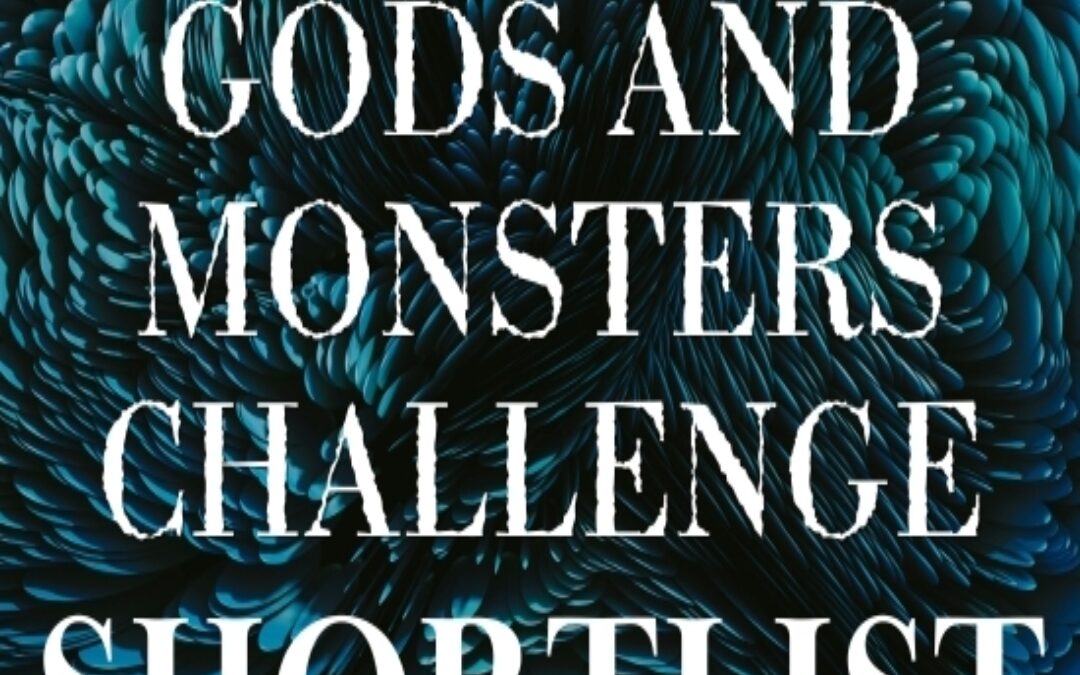
by Fractured Lit | Jul 16, 2025 | news
We made some hard choices to create this shortlist for the Gods and Monsters Challenge! Congratulations to these writers! We’ll choose a winner by next week!
Shortlist:
- It’s a Monster, Baby
- Return
- Barnacle Moon
- Tokoloshe
- From Clay, God
- China Plate
- What the Bones Remember
- Silence of Mothers (Selene Speaks)
- The one with the birds…
- Addie, the Lamp & the Wager
- Chimei
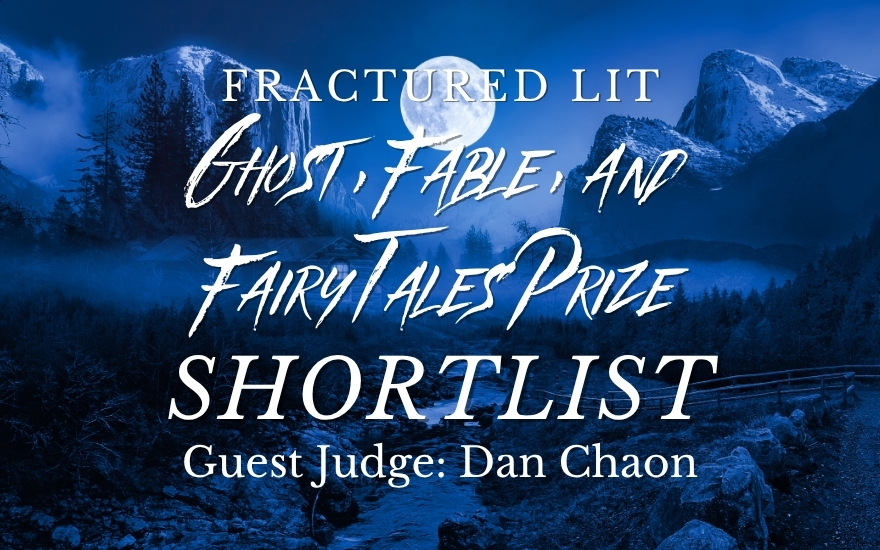
by Fractured Lit | Jul 15, 2025 | news
Check out the titles of these 20 stories! Congrats to all of our short-listed writers! Your story stood out to our readers and editors, and we’re excited to send it to Judge Dan Chaon!
Shortlist:
- Closed for the Season
- The Walker at Night
- Wolfie
- Bakunawa and the Seven Sisters
- Windows into the Solar System
- In the Hedgerow
- Reckoner
- Disenchanted
- Out of the Woods
- Triple Body Walking
- Song
- The Ethics of Hematophagy
- My Mother the Sea
- Zen Lyrics for the Carhartt Guru
- The Ghost of No Regret
- Almalette
- The Return
- The 6:42 A.M. Caltrain from San Jose
- The Invisible Wild
- OWL FANTASMA

by Anna Cabreros | Jul 15, 2025 | contest winner, flash fiction
My sister Jane and I make the ideal jigsaw puzzle partnership. She’s more organized than me, the one who categorizes and compartmentalizes, but I have all the patience.
Most recently, we tried a 1,000-piece train travel scene. She dutifully separated the pieces into little groups – landscape, tray of food, luggage, maps. And then there are always those pieces that color-match but blend amorphously into the backdrop—the wall, the shadows, the seat cushions.
I will obsess over fitting these mundane pieces together. But Jane hates the slog. So she focused on the tray of food and the maps as I toiled through the pieces that all looked pretty much alike.
When we invited the police officer inside that night, I had nowhere to put my nervous energy but the puzzle. I’m sure the officer wondered how I could focus on a puzzle amidst a crisis. But I couldn’t make myself stop. I felt the disoriented need to be constructive even as I knew nothing I did would change a thing.
“I’m going to ask you some questions. I have to ask them to everyone even though I already have the details of tonight.”
“Okay,” said Jane.
I rotated a bluish blurry piece and tried to fit it to another. No luck, no matter the angle.
“Has he ever hit you before tonight?”
“No,” she said.
“Has he ever choked you?”
“No.”
“Does he have a weapon?”
“Yes.”
“Has he ever threatened to kill you?”
“No.”
How much has this questionnaire changed since we were kids? I wondered. Did it even exist back then? I thought of how varying the answers would have been depending on the timeline.
As the officer rattled off more questions, I kept trying the pieces. Sometimes looking for matching colors, sometimes honing in on the particular curvature of each edge. I had a few successes, but spent most of my time relentlessly rotating the shapes in hopes of finding them a home.
After the questionnaire was finished, the officer handed my sister a pink paper.
“This is an information sheet with numbers to call if you need a safe place to be until we issue the arrest and the EPO. But it looks like you’ll stay here, with your sister?”
“Yes,” she said.
“That’s great,” said the officer. “Most women in this situation don’t have a safe place to go. You’re very fortunate.”
Yes, we agreed. Very fortunate.
The officer left, and I kept working the puzzle as Jane calmed herself down. We wondered if her husband would open the door to the police tomorrow since he had refused tonight. If maybe he was too drunk to have heard the police knock tonight. We wondered, when did it get this bad? How hadn’t she seen this coming?
She thought she knew him, she said. She knew he was being erratic and increasingly seemed violent, but she never thought he would take it to this extreme.
I was still worrying the pieces when Jane asked if I thought she should go ahead and get him arrested.
“I don’t know,” I said, pulling apart two mismatched pieces ferociously clinging together. “I would. But it’s not my life. It’s yours.”
My husband chimed in. “He doesn’t know how to control himself,” he said reasonably. “Call. It might be the only thing to de-escalate the situation.”
He was right, of course. And it was the only thing she hadn’t tried. It’s the one thing our mother never did.
We set up the air mattress in our youngest daughter’s room. On most weekends, she likes to bunk with her older sister. Jane smiled at the small sleeping forms gilded by the nightlight in the adjacent room. She gave me a tender look before retiring to the air mattress.
By the time she was settled, it was near 3 a.m. But I wasn’t tired. I lay in bed until I heard my husband’s breathing regulate, and then I returned to the dining room table.
Jane was there, trying to make sense of the pieces I had set aside. All of them were in the same family of blurry blue, but on closer look, they belonged to completely different parts of the picture.
“I can’t sleep,” she said. “I thought this would help.”
I nodded in agreement and acknowledged that I was there for the same reason.
“But I hate this part of the puzzle,” she said. “All the good stuff is done, and now every piece looks the same. It’s giving me anxiety, trying to sort it out.”
And for the first time that night, tears. She had held it together the entire time, from the moment he slammed her against the wall to the panicked moments on the phone with me, from escaping her house to making it to mine, from calling the police to being questioned by them. All of it had gone so quickly, almost calmly. But now it was over and we weren’t sure what was next and she had to decide whether or not she should have her husband arrested the next morning.
I held her and let her cry for a while. Then coaxed her back to bed.
As I walked back through the dining room, I glanced at the nearly finished puzzle. It was true. All the pretty parts of the puzzle were fully assembled, and what was left looked like a monochromatic mess. Big open spaces between the landscape and the tray of food and the luggage and the maps. White space littered with tiny odd shapes, all clearly belonging to each other in some way. But what a process, what a mundane and tedious and painful challenge it was to anchor the beauty to the murky background.











Recent Comments